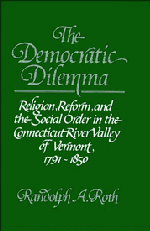 The Democratic Dilemma
The Democratic Dilemma Book contents
- Frontmatter
- Contents
- List of tables and maps
- Acknowledgments
- Introduction
- 1 The revolutionary frontier, 1763–1800
- 2 The failure of the covenanted community and the standing order, 1791–1815
- 3 Religion and reform in the shaping of a new order, 1815–1828
- 4 From an era of promise to pressing times, 1815–1843
- 5 A clamor for reform, 1828–1835
- 6 The great revival, 1827–1843
- 7 A modified order in town life and politics, 1835–1850
- 8 Boosterism, sentiment, free soil, and the preservation of a Christian, reformed republic
- Conclusion: Religion, reform, and the problem of order in the Age of Democratic Revolution
- Appendix A Church records
- Appendix B Types of towns
- Appendix C Occupational groups
- Appendix D Statistical methods
- Notes
- Index
Conclusion: Religion, reform, and the problem of order in the Age of Democratic Revolution
Published online by Cambridge University Press: 04 August 2010
- Frontmatter
- Contents
- List of tables and maps
- Acknowledgments
- Introduction
- 1 The revolutionary frontier, 1763–1800
- 2 The failure of the covenanted community and the standing order, 1791–1815
- 3 Religion and reform in the shaping of a new order, 1815–1828
- 4 From an era of promise to pressing times, 1815–1843
- 5 A clamor for reform, 1828–1835
- 6 The great revival, 1827–1843
- 7 A modified order in town life and politics, 1835–1850
- 8 Boosterism, sentiment, free soil, and the preservation of a Christian, reformed republic
- Conclusion: Religion, reform, and the problem of order in the Age of Democratic Revolution
- Appendix A Church records
- Appendix B Types of towns
- Appendix C Occupational groups
- Appendix D Statistical methods
- Notes
- Index
Summary
The democratic revolution had promised to realize the aspirations of people throughout the Western world. Its adherents in the Connecticut River Valley of Vermont discovered that victory over aristocracy and established religion could not redeem that promise, however. Their aspirations were too complex and contradictory to be realized in any straightforward fashion, and democracy, far from alleviating popular discontent, often compounded it. The democratic revolution did not solve problems; it posed dilemmas. It forced the valley's revolutionaries, and indeed all of America's revolutionaries, to admit that they wanted a society dedicated to more than just the progressive values of freedom, equality, tolerance, competition, and popular government, and to recognize that democracy could threaten cherished traditions, expectations, and institutions as much as aristocracy and establishment.
The revolutionaries' only hope of resolving these dilemmas lay in constructing postrevolutionary orders that could sustain conflicting values and interests in the face of constant challenges. These postrevolutionary orders were nowhere alike. In southern New England, on the revolutionary frontier, in the slave states, and in the middle states, they varied according to the particular visions of order, justice, and harmony that each people sought to realize, according to the thoroughness of democracy's triumph over antidemocratic forces and according to the ways in which democratic ideas and institutions, as well as postrevolutionary economic and demographic change, impinged upon prerevolutionary society. Revolutionaries everywhere feared that the balance of opposed forces upon which these orders rested would come undone.
- Type
- Chapter
- Information
- The Democratic DilemmaReligion, Reform, and the Social Order in the Connecticut River Valley of Vermont, 1791–1850, pp. 299 - 310Publisher: Cambridge University PressPrint publication year: 1987


